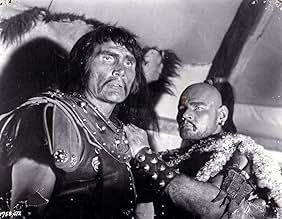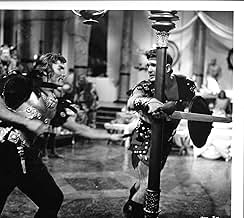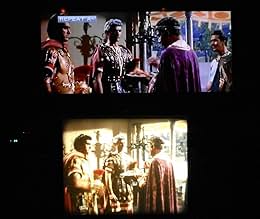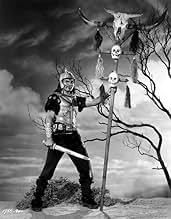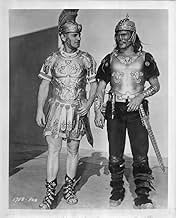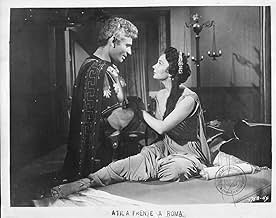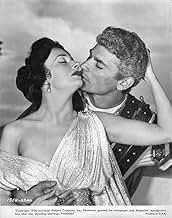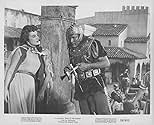Con el Imperio Romano dividido, Atila el Huno espera conquistarlo. En su camino se encuentran un valiente centurión, una bella princesa y el cristianismo.Con el Imperio Romano dividido, Atila el Huno espera conquistarlo. En su camino se encuentran un valiente centurión, una bella princesa y el cristianismo.Con el Imperio Romano dividido, Atila el Huno espera conquistarlo. En su camino se encuentran un valiente centurión, una bella princesa y el cristianismo.
- Dirección
- Guionistas
- Elenco
Ludmilla Tchérina
- Princess Pulcheria
- (as Ludmilla Tcherina)
Robert Bice
- Chilothe
- (as Robo Bechi)
Opiniones destacadas
At 7:05 pm on Saturday, 1 May 1976, BBC 1 showed the complete and uncut version of Sign of the Pagan. Puzzlingly, this was probably the last time that anyone was allowed to see Ludmilla Tcherina's exotic dance number. For reasons known only to the Universal studios, that whole sequence has been deleted from subsequent television showings, both on American station AMC and Britain's Channel 4. Nor do DVD releases contain the dance, even though the main title still credits Kenny Williams as choreographer, leaving viewers wondering what he could have possibly choreographed. Most surprising of all is the 2011 German DVD "special edition" which presents both the original wide screen and 4 x 3 versions. Even here, Universal have cleanly cut the dance number from both prints and both languages.
For those who have never seen the sequence, Attila has just won the palace show fight with Herculanas. After that, the Emperor commands his sister, the Princess Pulcheria, to dance for the visiting barbarians. For the first 50 seconds she performs a graceful and dignified piece of ballet which the barbarians obviously find boring. Therefore, the Emperor tells a servant, "Advise my sister this is not suited to barbarian taste." So ordered, the Princess switches to a more raunchy routine that the visitors find much more enjoyable. This lasts about two minutes. Few genre fans would argue that, in both the Hollywood and Italian epics, the exotic dance interlude is something of a highlight. We get to see beautiful girls in eye-catching costumes, always accompanied by some classy music. Indeed, the ballet score we hear (or used to hear) from Salter and Skinner in Sign of the Pagan is arguably the best music they ever composed.
Universal obviously hope no-one's going to notice what they've done, but why did they do it in the first place? One can only theorize. Perhaps the film was cut at some stage to fit into a fixed television slot. Or maybe the dance was excluded to make the film more suitable for children's matinees. Then nobody remembered to put the scene back? A somewhat wilder theory is that it's a rights issue. Remembering how the Gershwin estate, not liking the Porgy and Bess movie, have tried for years to prevent anyone seeing it, could Ludmilla Tcherina and her estate have somehow bought out this dance scene and are now withholding it because it does not enhance her memory as a classical ballerina? But surely Universal, with all their wealth, would hardly spoil one of their classics just to grab a few dollars?
Whatever the reason, most fans will agree that missing scenes in movies are a continuing source of irritation. Come on, Universal, put it back!
For those who have never seen the sequence, Attila has just won the palace show fight with Herculanas. After that, the Emperor commands his sister, the Princess Pulcheria, to dance for the visiting barbarians. For the first 50 seconds she performs a graceful and dignified piece of ballet which the barbarians obviously find boring. Therefore, the Emperor tells a servant, "Advise my sister this is not suited to barbarian taste." So ordered, the Princess switches to a more raunchy routine that the visitors find much more enjoyable. This lasts about two minutes. Few genre fans would argue that, in both the Hollywood and Italian epics, the exotic dance interlude is something of a highlight. We get to see beautiful girls in eye-catching costumes, always accompanied by some classy music. Indeed, the ballet score we hear (or used to hear) from Salter and Skinner in Sign of the Pagan is arguably the best music they ever composed.
Universal obviously hope no-one's going to notice what they've done, but why did they do it in the first place? One can only theorize. Perhaps the film was cut at some stage to fit into a fixed television slot. Or maybe the dance was excluded to make the film more suitable for children's matinees. Then nobody remembered to put the scene back? A somewhat wilder theory is that it's a rights issue. Remembering how the Gershwin estate, not liking the Porgy and Bess movie, have tried for years to prevent anyone seeing it, could Ludmilla Tcherina and her estate have somehow bought out this dance scene and are now withholding it because it does not enhance her memory as a classical ballerina? But surely Universal, with all their wealth, would hardly spoil one of their classics just to grab a few dollars?
Whatever the reason, most fans will agree that missing scenes in movies are a continuing source of irritation. Come on, Universal, put it back!
Very enjoyable Douglas Sirk one and only foray into the sword and sandal genre. Competently made, it has a lush look though obviously made on a small budget. With the stilted dialogue one might expect of such a saga, it somehow remains credible though at times teeters precariously on the borders of camp.
Jeff Chandler turns in a solid performance delivering his lines with diction suited to Shakespeare. Panther like Jack Palance sporting a Fu Manchu moustache is perfectly suited to playing Atilla the Hun which he does with much relish. Despite the numerous forgettable roles in equally numerous trivial movies, one senses that there was something there that never quite came to fruition. The closest he came to really great acting was "The Big Knife" made the following year.
Although Sirk wasn't originally allotted to this movie, it would seem he was willing to try his hand in a genre new to him. As with his only western "Taza Son of Cochise", he proved himself able to work in the genre as well as most, though added little extra of any note.
Expertly filmed by the great Russell Metty who Sirk wisely used on most of his movies.
Jeff Chandler turns in a solid performance delivering his lines with diction suited to Shakespeare. Panther like Jack Palance sporting a Fu Manchu moustache is perfectly suited to playing Atilla the Hun which he does with much relish. Despite the numerous forgettable roles in equally numerous trivial movies, one senses that there was something there that never quite came to fruition. The closest he came to really great acting was "The Big Knife" made the following year.
Although Sirk wasn't originally allotted to this movie, it would seem he was willing to try his hand in a genre new to him. As with his only western "Taza Son of Cochise", he proved himself able to work in the genre as well as most, though added little extra of any note.
Expertly filmed by the great Russell Metty who Sirk wisely used on most of his movies.
This movie is not exactly great, but it is probably my personal favorite. And it's all because of Jack Palance's performance as Attila the Hun. I just love Jack Palance. He is one of Hollywoods first real tough guys. Before Stallone and Van Damme, there was Palance. It is sad that his early films have been sort of forgotten. They were classics. And "Sign of the Pagan" was one of his finests acting jobs. He played the part like he was born for it. All the other characters in the film were far less colorful. He stole the show! The story of the movie is definitely more Hollywood then history. And the real Attila the Hun was a dwarf. But that's okay, it still is most enjoyable. I've watched it maybe about 100 times. I don't think most people will want to do that. However, the princess is a mighty hot looking babe with a fine body. She could dance for me anytime. Attlia gets to kiss her too. Lucky Guy!
According to Marilyn Kirk's biography of Jeff Chandler, Chandler was originally offered the role of Attila in Sign Of The Pagan. I think he was wise to decline as he would have been ill suited for the part. But I think Jeff would have been smart to skip this one altogether. He's rather colorless as the centurion who becomes Captain-General of the Roman forces.
When Jack Palance is on screen as Attila the Hun there ain't a stick of furniture safe in his view. It's that kind of part so sit back and enjoy. In fact Anthony Quinn took the same approach when he did Attila in a film that came out around the same time.
Nothing remotely historically accurate about Sign Of The Pagan other than Attila's meeting with Pope Leo I and his turning back from his conquest of Rome. Moroni Olsen in his farewell big screen performance is is the Pope. No one knows what was actually said so its is all open to speculation.
If you love scenery chewing acting when it's called for than Sign Of The Pagan is your kind of film.
When Jack Palance is on screen as Attila the Hun there ain't a stick of furniture safe in his view. It's that kind of part so sit back and enjoy. In fact Anthony Quinn took the same approach when he did Attila in a film that came out around the same time.
Nothing remotely historically accurate about Sign Of The Pagan other than Attila's meeting with Pope Leo I and his turning back from his conquest of Rome. Moroni Olsen in his farewell big screen performance is is the Pope. No one knows what was actually said so its is all open to speculation.
If you love scenery chewing acting when it's called for than Sign Of The Pagan is your kind of film.
Overall production value is not very high on this film; I seem to recall the film's inability to pass off studio sets as exterior locations. My recollection is of a very "TV-like" production on the level of a "B" movie with a large then usual budget. However, Jack Palance is excellent as Attila the Hun. He really does come across as a barbarian, giving a very intense performance that compares well with his earlier role as Toriano in "Arrowhead" with Charlton Heston. Some great supporting roles, also, with Jeff Morrow (This Island Earth) playing the grizzled Roman General, and Alexander Scourby (famous for his narration/voiceover work) playing Chrysaphius the Eunuch, advisor to Theodosius II. Jeff Chandler's subdued performance is a good match for the stoic Christian Roman he plays. It's a good counterpoint to Palance's growling Attila. For years, I thought Palance was short of stature, based on his sword fighting here with Jeff Chandler, but it was just that Chandler was several inches taller than Palance who was himself 6' 2"...
Interesting trivia:
The uncredited narrator of the film is Rex Reason who co-starred with Jeff Morrow in "This Island Earth."
Interesting trivia:
The uncredited narrator of the film is Rex Reason who co-starred with Jeff Morrow in "This Island Earth."
¿Sabías que…?
- TriviaUniversal International's first film in CinemaScope.
- ErroresAll of the mounted troops have stirrups, which would not come into use in Europe for at least another four hundred years.
- Citas
Pope Leo I: Rome is a Christian city, and the Temple of God!
- Créditos curiososAfter the list of actors at the start of the film it says: "AND Statesmen, Citizens, Soldiers of the Armies of the Roman Empire and the Hordes of Attila"
- ConexionesReferenced in Pardon My Genie: Sister, Dear Sister (1972)
Selecciones populares
Inicia sesión para calificar y agrega a la lista de videos para obtener recomendaciones personalizadas
- How long is Sign of the Pagan?Con tecnología de Alexa
Detalles
- Fecha de lanzamiento
- País de origen
- Idioma
- También se conoce como
- Attila, der Hunnenkönig
- Locaciones de filmación
- Productora
- Ver más créditos de la compañía en IMDbPro
Taquilla
- Presupuesto
- USD 1,300,000 (estimado)
- Tiempo de ejecución
- 1h 32min(92 min)
Contribuir a esta página
Sugiere una edición o agrega el contenido que falta

